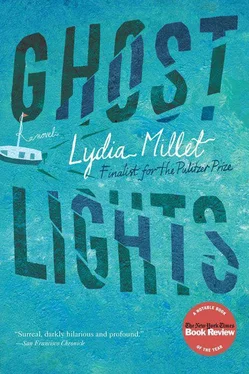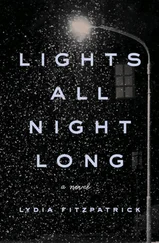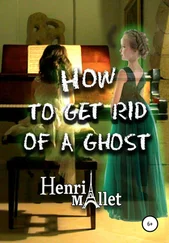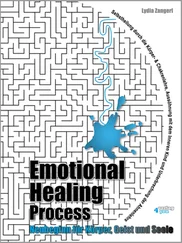Lydia Millet - Ghost Lights
Здесь есть возможность читать онлайн «Lydia Millet - Ghost Lights» весь текст электронной книги совершенно бесплатно (целиком полную версию без сокращений). В некоторых случаях можно слушать аудио, скачать через торрент в формате fb2 и присутствует краткое содержание. Издательство: W. W. Norton & Company, Жанр: Современная проза, на английском языке. Описание произведения, (предисловие) а так же отзывы посетителей доступны на портале библиотеки ЛибКат.
- Название:Ghost Lights
- Автор:
- Издательство:W. W. Norton & Company
- Жанр:
- Год:неизвестен
- ISBN:нет данных
- Рейтинг книги:5 / 5. Голосов: 1
-
Избранное:Добавить в избранное
- Отзывы:
-
Ваша оценка:
- 100
- 1
- 2
- 3
- 4
- 5
Ghost Lights: краткое содержание, описание и аннотация
Предлагаем к чтению аннотацию, описание, краткое содержание или предисловие (зависит от того, что написал сам автор книги «Ghost Lights»). Если вы не нашли необходимую информацию о книге — напишите в комментариях, мы постараемся отыскать её.
How the Dead Dream
Ghost Lights
Ghost Lights
Ghost Lights — читать онлайн бесплатно полную книгу (весь текст) целиком
Ниже представлен текст книги, разбитый по страницам. Система сохранения места последней прочитанной страницы, позволяет с удобством читать онлайн бесплатно книгу «Ghost Lights», без необходимости каждый раз заново искать на чём Вы остановились. Поставьте закладку, и сможете в любой момент перейти на страницу, на которой закончили чтение.
Интервал:
Закладка:
When they came to move him, loading him onto a stretcher, he would make sure he got a look at the sky beyond the buildings. The stars would be even better, but in a city there was too much ambient light to see the stars clearly.
He heard sniffing. There was a dog next to him, nuzzling his face. The way it tossed its head slightly, nudging with the long wet nose, was endearing. He had to squeeze his eyes closed against the tongue and at the same time he tried to reach out to pet it, but his arm was shaking too much. . a black dog, a mutt in the Labrador family. Now it had moved down from his face and was lapping at something. He was afraid — yes. Lapping up his blood. He did not blame it for this, though it was a strange sensation: the dog bore him no ill will. We lick what we can, was the motto of dogs. Was it any different from when they licked the salt off your hands or your face?
He recalled T.’s dog, dog on three legs. This one was here, the other was back at home waiting. Dogs all over the world.
It was a comfort. He might be gone, he himself might be gone, but everywhere were the dogs, with their faithful dispositions. It seemed you could rely on them. The dogs were a kind of love, given freely to men. Their existence meant you did not have to be alone. For if, in the end, you found yourself alone, completely alone, and it was chilling, you could look for a dog. And there, in the dog, would be love. You did not have to deserve a dog. Rather a dog was a gift, a gift and a representative. What a dog was was simple: the ambient love of the world.
The dog moved off after a while — or rather, at a certain point it was not there anymore. Hal thought he might have fainted and missed it leaving.
If he still could, he decided, he would get his own dog. When he got home he would go out and get a dog of his own. A dog from a shelter, a dog that needed someone.
He could hear people laughing, possibly in a nearby bar or restaurant. He had always liked going to bars and restaurants; he should go to more of them. Take Susan along with him. Although he might be dying. If so, he couldn’t take her to any more restaurants. But he was sorry for his behavior, so trivial and selfish. Whatever made her happy. . have some paralegals. There, there. Have yourself a paralegal or two.
Really, I mean it, he told her. He would pass out the paralegals like cigars at a birth.
He was so sorry now that he had left her alone, left her alone years ago and never looked back, when all he thought of was Casey, worrying. He had never intended to leave anyone, it was the last thing he would ever have intended, but it turned out he was the abandoner.
This was shocking. It was just like the wound. It was a wound in himself, like the hole from stabbing. Only now did he look down and notice it: he himself did the abandoning.
Of course poor Susan needed company. She should never have been abandoned.
He hoped the laughing people were in a restaurant, celebrating something with lanterns strung up and deep warm colors that were welcoming. He was almost — almost — at the table himself. There were reflections of lanterns on his own glass, which he would raise to the crowd. If they could see him.
He was sorry for the boy, the stabbing boy, but then the boy, he recognized, was also his daughter. Not that Casey had ever stabbed him. He corrected himself, as though someone was listening. It was his feeling he meant, his feeling. . as soon as they were past, perceptions took on a transparency. There was an impulse, it fled, and then he saw what the impulse meant. He saw through the obfuscations of his own mind, through the dodges of his remorse and his wishful thinking, and behind it all was a vision of his daughter.
It was Casey he wanted to apologize to, not the boy, and it always would be. When you were born, he could say to her, I was born too.
This appeared to him in the light of a new idea, though it was not. I was born then because it was true, as soon as you existed, that I only existed to care about you. From then on I myself was nothing.
And you know what, sweet girl?
I was happy that way.
“It was you who made me necessary,” he said.
It came out as a mumble. He wished he could hold her close in perpetuity, as he had wished so often when she was small. He was astonished, when he thought about it, that every man was not a criminal before he was graced with a child, astonished that any man was good at all before that. Many of them were not, actually. Statistics told the story: most vicious criminals, the warriors and ax murderers and gangbangers, were young men. Except for the rare among them who were born nice, they needed a child to civilize them.
And yet, of course, they should not be granted the privilege.
He would tell her: It was you who gave me the reason for my life. Before you I was proud — proud and empty. I had no idea what it was like to beg the world for mercy and not be heard, never be heard at all. But still to go on begging, unheard. I knew nothing.
And then I failed you.
He would say this clearly, making sure she understood how fully, fully acquainted he was with his failure. He had failed to protect her, failed in his one genuine calling, being her father. He did not accept this, in the sense that he repudiated it, but he knew it all the same. You could know something and at the same time reject it, no contradiction there. I failed, he would say to her, I failed at the moment when you were hit and after that moment I would never stop failing.
And it was you who suffered for my failings.
That was the problem of the religion he’d been born into. Christians, he thought: his parents had been two of them, but he could never bring himself. He had lived and now was dying an un-Christian, quite pleasantly godless. . for the problem with the story of Jesus was simply this: it was a reversal, it was a perfectly backward version of the story of humankind, a mirror image of the world. For in reality itself, as opposed to the holy script, it was not one man who suffered and the rest of the world that was saved. It was the whole world that suffered for the sake of one man.
He could make the stipulation now, he could indulge in bombast now that he was, so unexpectedly, becoming dead. The whole world suffered and bled for all eternity, through all of human history, so that a minuscule, paltry few could have leisure and joy and the liberty of wealth for as long as they each should live. There is no doubt, the poor are the sacrifice, he thought, and he remembered this knowledge like a sight he had seen — all the poor and the untended and powerless. Together they are Jesus on the cross, bleeding so openly, bleeding for all to see, and thin like Jesus too, their arms and veins opened.
And yet the rich, especially the very, grotesquely rich, that fraction of a percent that make up the one man that is saved, blithely deny the truth of this, though it is perfectly obvious and as transparently clear as glass. The rich may worship God or they may pretend to but they are kicking Jesus to the floor daily, kicking him viciously and stepping on his face.
Because the poor are Jesus, in their billions. Plain as the nose on his face. . and he himself, neither Jesus nor Judas but someone in between, was dying.
But maybe it would be all right in the end, or in the end beyond the end. Maybe somehow a second chance would come for him. And next time he would make sure she was not injured at all. He would take her away to a safe place and there she would be kept separate from accidents. . there had to be a shelter like that for her, even for both of them. As simple as that bar at the end of the street, beaming its warmth. Was it so much to ask? A safe place for his little girl. If bargains were possible he would give himself up a thousand times before he would let them hurt her. Let them accept him, let them accept his pathetic, meaningless sacrifice. It was paltry. He knew that, for chrissake. But what else did he have, what else could he bargain with?
Читать дальшеИнтервал:
Закладка:
Похожие книги на «Ghost Lights»
Представляем Вашему вниманию похожие книги на «Ghost Lights» списком для выбора. Мы отобрали схожую по названию и смыслу литературу в надежде предоставить читателям больше вариантов отыскать новые, интересные, ещё непрочитанные произведения.
Обсуждение, отзывы о книге «Ghost Lights» и просто собственные мнения читателей. Оставьте ваши комментарии, напишите, что Вы думаете о произведении, его смысле или главных героях. Укажите что конкретно понравилось, а что нет, и почему Вы так считаете.












